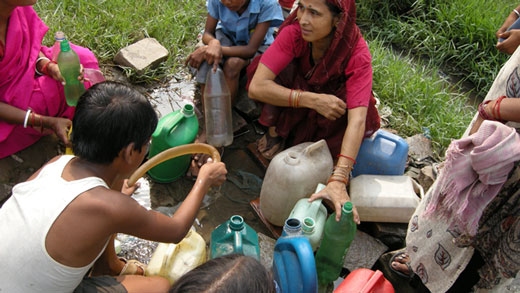A new report on water for food security and nutrition led by Lyla Mehta shows how land, food and water issues are inextricably linked and must be reflected in policymaking
In the Red Room of Rome’s Food and Agriculture Organisation of the United Nations, a landmark report is being launched this morning, which, in the most tangibly ancient of European cities lays down some history of its own; it is the first f its kind to address water, food security and nutrition together.
The Water for Food Security and Nutrition Report from the High Level Panel of Experts (HLPE) sets benchmark for addressing the essential interconnections between water, food security and nutrition and understanding these links in order to most effectively tackle poverty. It goes far beyond a focus on agricultural issues and highlights the necessity of water and sanitation for human wellbeing and survival and the crucial importance of gender equality.
Professor Lyla Mehta, the STEPS Centre’s water and sanitation convenor and Fellow at the Institute of Development Studies, led the report for the UN Committee on World Food Security (CFS) and has today written for the Guardian calling for policy coherence at all levels of governance and management around water, food security and nutrition issues.
“There is no doubt that land, food and water issues are linked. The barriers to joined-up national and global policies do not derive from a lack of technology or resources. Rather they are rooted in the absence of human rights, and the failure to recognise that water and food are intertwined,” writes Prof. Mehta.
“The HLPE report argues for coherence on these issues at all levels of policymaking and management, from local to global. We are calling for a human rights approach to water governance to enhance food security and nutrition. Only this will ensure healthy and productive lives for all,” she adds.
Prof. Mehta and other researchers at the STEPS Centre have been investigating the interconnections between water-food-energy-environment issues and the science-policy interface of the nexus for many years. A few of the key STEPS resources are listed below.
Related resources from the STEPS Centre:
- Journal article: Special issue: Critical Thinking on the ‘New Security Convergence’ in Energy, Food, Climate and Water: Is the Nexus Secure … and for Whom?
- Working Paper: Not Another Nexus? Critical Thinking on the New Security Convergence in Energy, Food, Climate and Water STEPS Working Paper 75 by Shilpi Srivastava and Lyla Mehta
- Blogs: The nexus – politics, practice and disciplinary dilemmas
- Blog: Is it time to refocus the Water-Energy-Food nexus?
- Project: Urbanisation in Asia: the peri-urban interface and sustainability of south Asian cities
- Project: Uncertainty from Below
- Project: The Nexus Network – food, energy, water and environment connections
- Research: Find out more about the STEPS Centre’s water and Sanitation work
- Media: Are African land grabs really water grabs? By Jennifer C Franco, Lyla Mehta and Gert Jan Veldwisch, CNN
- Film: Water and Justice: Peri-urban pathways in Delhi
- Film: Seeds and Sustainability: Maize pathways in Kenya
- IDS Bulletin, ‘Some for All?’ Politics and Pathways in Water and Sanitation, edited by Alan Nicol, Lyla Mehta and Jeremy Allouche
- Resources: list of the STEPS Centre’s STEPS water publications and resources which can be downloaded.
- Presentations: from the STEPS event Not another nexus? Critical thinking on the ‘new security convergence’ in energy, food, climate and water
